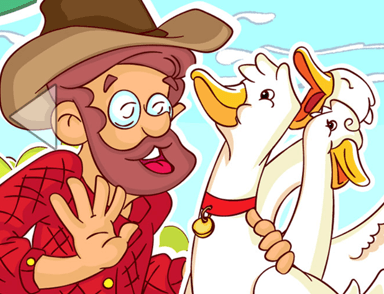Teacher's support sheet

A Day on the Farm
Peter spent an unforgettable day at his uncle Joe's farm.
He met several animals, rode horses and played in the river!
Embark on this story and learn more about the animals raised on the farm.

Teacher’s tips
Level of education: Elementary School - Early Childhood Education
Age: 04 to 08 years old
The farm is a place where children learn all about farming, how much work and planning goes into running a farm, and how farms are important to our daily lives. In addition, they learn where our food comes from, the importance of caring for plants and animals. For older kids, a day spent on the farm is living proof that hard work pays off. Signs are everywhere; from the growing animals to the thriving fields. This book is a great opportunity for you to work on this topic.
Learner outcomes
Understand the difference between wild animals and domestic animals; Understand the importance of agriculture; Understanding where our food comes from; Develop text reading and interpretation; Understand the use of the alphabet in the construction of words; Expand vocabulary; Stimulate the imagination; Stimulate creativity; Participate in different moments of reading; Develop attentive listening to understand texts; Develop and improve oral and written language; Read different types of short stories;
Teachers’ goals
Teach children about caring for plants and animals; Work on reading and text interpretation skills; Provide, in a playful and creative way, the progress in the reading and writing process of children; Expand the class's repertoire of letters and words; Offer the game as a didactic resource to fix the content worked in the classroom; Awaken the habit of listening and feeling pleasure in situations involving reading; Provide contact with texts of literary quality;
Suggestions of approaches for the teacher
(Suggestion 1) Ask students to make a mural about the difference between wild animals, domestic animals and exotic animals. The mural must contain several figures and the definition of each one of them;
(Suggestion 2) Ask the students to make a drawing or collages of the products that come from the farm;
(Suggestion 3) Ask students to write the importance of caring for plants and animals to obtain quality food;
(Suggestion 4) Ask students to do a research on the difference between organic and processed foods;
(Suggestion 5) Have a picnic after carrying out the activities on the subject;
(Suggestion 6) Ask students to make a comic strip whose main theme involves day-to-day life on the farm.
More about it
Reasons why children need contact with the countryside:
• Farming teaches children where their food comes from
• Farming teaches children responsibility: Everything raised or grown on a farm is up to the farmer. Daily care for animals and plants is essential for the creation and production of a quality, healthy and delicious product.
• Farming teaches kids to care for animals: Proper care for animals is essential to creating quality food. Animals need food, shelter to grow up healthy and happy.
• Farming teaches children a greater appreciation for food: Spending a day, a week or a lifetime on the farm will change the way you look at food. Food becomes a reward, not just something that comes from a grocery store.
• Farming teaches children the cycle of life: One of the most difficult aspects of farming is the fact that where there are live animals, there are dead animals.
• Farming teaches children that hard work brings sweet rewards.
